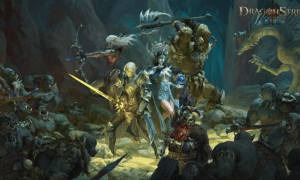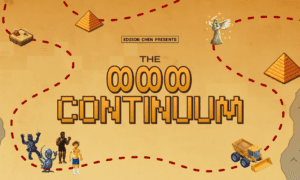1. Introduction: The Rise of Blockchain in Gaming
There is much that has happened with regard to technological revolutions in the gaming world. None, however, nears the approach of blockchain technology. Blockchain is a distributed ledger technology most prominently connected with cryptocurrencies such as Bitcoins, which are gradually taking over the various industries one after another, ranging from entertainment and gaming. For those who want to enter this business or expand their own game development business, the knowledge of blockchain and its applications in gaming is therefore of paramount importance. Blockchain in gaming represents a new frontier that is forever changing the way games are designed, played, and monetized. This paper will discuss and cover all that a new entrant requires to know about blockchain in gaming, ranging from benefit to challenge, and further present to aspiring potential entrants new opportunities in this emerging business sector.
2. What Is Blockchain, and How Does It Work in Gaming?
Basically, it is this decentralized system, where data can be stored in a distributed ledger, dispersed across a network of computers. It is safe and transparent yet unfeasible to alter, and it is pretty useful in very many applications, starting from games to health records. Effectively, blockchain ensures that transactions and data exchanges inside a system are valid, verifiable, and irreversible.
Blockchain holds much potential in gaming in terms of applications that would change the way games function. Probably one of the most exciting functionalities of blockchain in gaming is about digital assets creation and transfer. Traditionally, these items such as skins, weapons, or characters exist in the ‘hands’ of a game developer and cannot be bought or sold freely outside of it. For example, with the introduction of blockchain into games via NFT, gamers can own, trade or sell their unique digital assets on marketplaces based on different blockchains.
With NFTs, items in the game, such as in-game items, represent the ownership of that particular item. Players have real-time control over their digital assets, meaning a whole new level of involvement for players and ways to monetize achievements in games. This is yet to mean in implementing blockchain where the latter allows the blockchain game development companies to design a more player-centric model, where these people are the consumer but more importantly, part of an extended economic ecosystem. That means something new that goes beyond profit opportunities, creative expressions, and social interaction within the gaming domain.
3. What are the Benefits of Blockchain in Games?
One of the key reasons why blockchain is slowly finding space in the gaming world is that it promises to bring a whole host of benefits both to the developers and to the players. Blockchain technology for the first time opens up doors for the true ownership of in-game properties or assets, which otherwise was not feasible in traditional gaming environments. Here, tokenizing in-game items as NFTs allows players to manage their digital property directly, which could further be moved and sold between games and even between platforms.
This free flow of assets between games or even within ecosystems opens up new possibilities. For instance, if a player acquires a rare weapon within one game, that same player can sell it to another or use that asset in a different blockchain-based game. It means openability in ways that weren’t conceivable before and opens up new ways of how players can interact with their digital content. In addition to these, blockchain also offers transparency and security, ensuring ownership and risk-free transaction execution.
Another relevant benefit is that blockchain brings new revenue models into gaming. It allows developers more innovative monetization strategies for that matter, such as a marketplace directly between players, microtransactions, and decentralized game economies. Instead of just using in-app purchases or being subscription-based only, developers can create some integrated economies within the games where players can earn some tokens or cryptocurrency by participating in its in-game activities. It will most certainly give rise to what is called “play-to-earn” type of games where actually players can generate real money through playing and contributing to the game world.
Blockchain can also increase the transparency in a gaming transaction. Traditional centralized systems would have developers and publishers running the game content distribution, and players would be somewhat in the dark over the kind of mechanics of the game, as well as monetization practices. Blockchain technologies would ensure that every transaction, as well as all other interactions with other games, are recorded on an immutable ledger. Thus, all the data would be available for the players to analyze the flow of distribution of in-game assets, how much money was spent, and through which channels the developer is raking in the dough. This transparency can build trust and loyalty among players-a far more important ingredient for a game’s or any gaming platform’s long-term success.
4. Challenges of Adding Blockchain to Games
There are, however, many challenges developers face when adding blockchain to their games. One big challenge is blockchain complexity. Blockchain is a quite new and developing technology, and integration with games requires a deep understanding of how it works. There is very little in the way of game developers being aware of smart contracts, NFTs, DeFi, and other blockchain-related concepts that would make use of blockchain in a game viable for those uninitiated in blockchain technology.
Another challenge is the scalability of blockchain. Most blockchain networks currently available, including the present Ethereum, have limitations in terms of transaction speed and cost. Validating a blockchain transaction requires a certain amount of computational power which can become expensive when large numbers of players are implicated and slow. For example, when it is peak time, gas fees-the cost of executing a transaction on a blockchain-become so expensive that it becomes less inexpensive for players to engage in transactions. This scalability issue must be overcome if blockchain-based games are to be widely adopted.
Another area of study is on the environmental impact of blockchain. Most blockchain networks, such as Ethereum, apply a proof-of-work consensus mechanism that requires substantial amounts of energy to validate the transactions in a blockchain network. This raises concerns over whether blockchain in gaming is environmentally sustainable. However, efforts are put in to alleviate this by shifting to other energy-efficient consensus mechanisms such as the proof-of-stake and finding eco-friendly blockchain platforms.
There is also the issue of market volatility associated with blockchain-based games. As most blockchain games incorporate cryptocurrency or tokens into the economy, the participants and developers will be sensitive to the market fluxes that can affect the value of assets. This unpredictability might dissuade the players from long-term participation as the value of some in-game assets might drastically fluctuate.
5. How to Start Blockchain Gaming Business
For those interested in entering the blockchain gaming market, there are some key steps to take. First and foremost is education on blockchain technology and its applications within gaming. That will involve learning blockchain basics, smart contracts, NFTs, and decentralized finance. Many online resources, courses, and communities are available for those who are looking to learn more.
With this as the foundation, the next step would be to determine which blockchain is perfect for your game. Many exist, each of which comes with their pros and cons; among the most popular ones is Ethereum, while the fees are lower and the speeds faster on Binance Smart Chain, Flow, and Polygon when compared to Ethereum. Depending on your needs, the platform you choose will depend on the type of game you’re trying to develop and maybe the number of transactions you expect.
Once you choose the platform, you will then implement blockchain functionality within your game. This entails implementing NFTs, in-game currencies, and smart contracts within the ecosystem of your game. You will also need to work with Blockchain developers that specialize in designing decentralized applications as well as integrating blockchain functionality into video games. Depending on the scope of your project, it may be worth exploring cooperation with blockchain game studios and consultants who can provide their expertise and guide you through the process.
Last, without debate, the technical and legal-regulatory part of blockchain gaming also needs to be understood. Where your location is can make using cryptocurrencies and NFTs subject to specific regulations. Therefore, there needs to be a process of ensuring that your game fits the set regulations. Depending on where you are, you may need professional advice from people who understand both blockchain technology and gaming.
The last and final step to success in the blockchain gaming space is building a community. Most blockchain games rely upon player-driven economies and ecosystems so building and holding a strong player base is important. This can be done by engaging with your community on social media, forums, events, and more as an effort to grow a loyal fan base for the game and its economy.
6. Conclusion: The Future of Blockchain in Gaming
Nevertheless, the promise blockchain holds for the future of gaming is quite huge as well-new opportunities in ownership, monetization, and even transparency in terms of a decentralized gaming ecosystem for players and developers alike. Blockchain allows players to be in complete control of in-game assets and share in newer economic models, such as play-to-earn games. Needless to say, rising issues still accompany newly emerging technologies, like scalability problems, environmental concerns, and market volatility.
For interested entrepreneurs, knowing the technology, its possible applications, and the challenges surrounding the same would be crucial in entering the blockchain gaming business. By opting for the right blockchain platform, integrating blockchain features into games, and having a strong community, developers can position themselves for success in such a rapidly growing and evolving sector. The maturation of blockchain technology is anticipated to further establish innovations in the gaming world, not only in business models and gameplay experiences but also potentially in economic opportunities for players and developers.



































